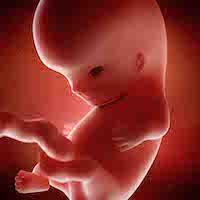13 Weeks Pregnant
At 13 weeks, you are in your last week of your first trimester. Whew! Your body has already gone through a lot of changes some of which you may be feeling on a daily basis. But you’re not the only one changing, your little peanut is growing quickly.
What’s happening with your body?
 If you experienced uncomfortable pregnancy symptoms, such as bloating, nausea and frequent peeing, you might be feeling a bit better as you head into your second trimester next week.
If you experienced uncomfortable pregnancy symptoms, such as bloating, nausea and frequent peeing, you might be feeling a bit better as you head into your second trimester next week.
But a few new symptoms may be popping up. You might notice more vaginal discharge these last few weeks and wonder what the heck is going on down there. The excess discharge is called leukorrhea and is due to increased estrogen. This thin, white discharge actually does more than just annoy you. It helps keep a healthy balance of bacteria in the vagina and protects the birth canal from infection.
Another change, which may occur, is an increase in the appearance of your veins. You may start to see a network of veins crisscrossing all over your chest and belly. Veins may be easier to see due an increase in blood volume, which occurs during pregnancy. In fact, your blood volume increases by about 30 to 40 percent when you are pregnant. The increase provides nutrients to your growing baby. The appearance of the veins should fade shortly after delivery.
What’s happening with your baby?
 It’s also an exciting time for your baby. He is now about the size of a plum and weights about 25g. Your baby now has lanugo, which is fine, soft hair over his little body. Lanugo often sheds in-utero the last month of pregnancy, but some newborns still have some, especially if they are born a few weeks early.
It’s also an exciting time for your baby. He is now about the size of a plum and weights about 25g. Your baby now has lanugo, which is fine, soft hair over his little body. Lanugo often sheds in-utero the last month of pregnancy, but some newborns still have some, especially if they are born a few weeks early.
His vocal cords are developing, although they are not put to use just yet. Your baby’s trachea is filled with fluid, not air, so he won’t be making any sounds. But in about 27 more weeks, when you baby is born he will put those vocal cords to work. He/she is also becoming their own unique self. Her little fingers have developed fingerprints.
Baby’s intestines are also becoming more mature. They had been developing in the umbilical cord, but as they mature, the intestines are now moving into your baby’s abdomen.
By 13 weeks, your baby is starting to make breathing-like movements. Since he is surrounded by amniotic fluid and not air, these “practice breaths” don’t provide oxygen to your little one. Instead, your baby gets oxygen through the umbilical cord.
Things to keep in mind:
As you head into your second trimester, you may be feeling a bit more energetic. For some women, that means a return to their exercise routine. In most cases, women can continue their regular exercise program during pregnancy. But there may be some exceptions, so it’s best to check with your healthcare provider first.
Be aware that you produce relaxin during pregnancy, which is a hormone that loosens your joints and ligaments. It helps your body prepare for childbirth. But while it serves an important purpose, relaxin can also make you more prone to injury while exercising.
That does not mean exercise is off limits during pregnancy. In fact, exercise can be beneficial for most women. It can increase your strength and stamina, both of which you need during labor.
Whether you were a regular exerciser or are new to working out, there are a few things to keep in mind.
- Steer clear from certain activities that may pose a fall risk: For example, biking and skiing are probably off limits once you reach your second trimester. Your balance may not be what it once was.
- Warm up properly: A proper warm up is essential to avoid any injuries to your joints and muscles. Your changing shape may place more stress on certain parts of your body, so start out slowly.
- Stay well hydrated: Dehydration can lead to premature contractions. Drink water before, during and after a workout.
- Listen to your body: If you feel dizzy, develop any sharp pains in your abdomen or start bleeding, stop any exercise and contact your healthcare provider.
- Avoid exercises where you lie on your back: After the first trimester, exercising while lying on your back puts pressure on a major vein. The result can be decreased blood flow to your uterus and brain, which may make you dizzy.
Irene Akidi
The overflow of mucus from the throat is too much and irritating, Spitting was too much